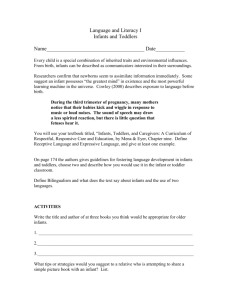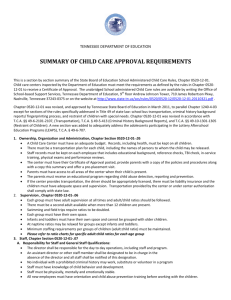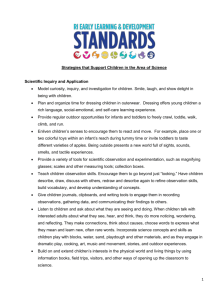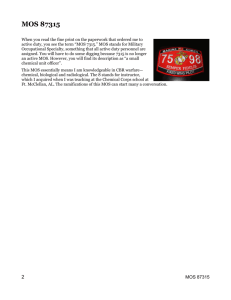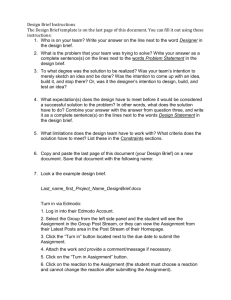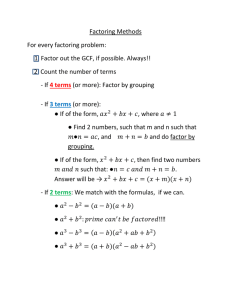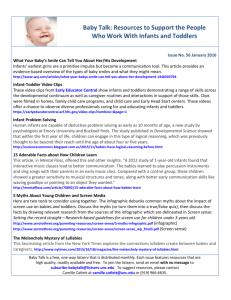tennessee department of education summary of child care approval
advertisement
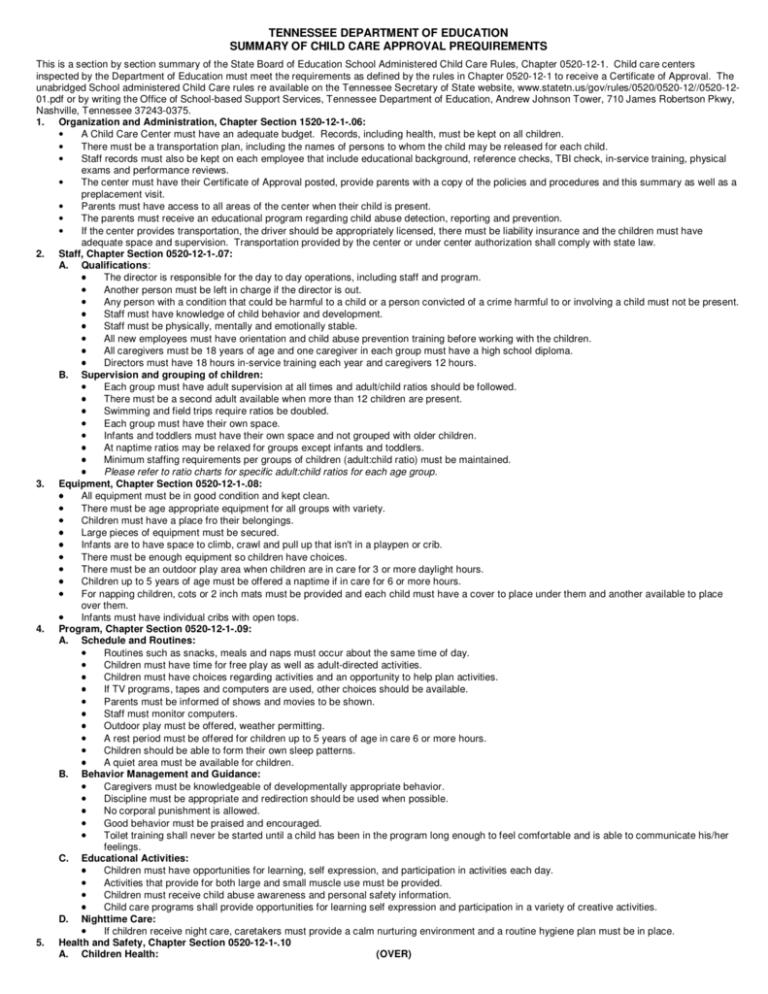
TENNESSEE DEPARTMENT OF EDUCATION SUMMARY OF CHILD CARE APPROVAL PREQUIREMENTS This is a section by section summary of the State Board of Education School Administered Child Care Rules, Chapter 0520-12-1. Child care centers inspected by the Department of Education must meet the requirements as defined by the rules in Chapter 0520-12-1 to receive a Certificate of Approval. The unabridged School administered Child Care rules re available on the Tennessee Secretary of State website, www.statetn.us/gov/rules/0520/0520-12//0520-1201.pdf or by writing the Office of School-based Support Services, Tennessee Department of Education, Andrew Johnson Tower, 710 James Robertson Pkwy, Nashville, Tennessee 37243-0375. 1. Organization and Administration, Chapter Section 1520-12-1-.06: • A Child Care Center must have an adequate budget. Records, including health, must be kept on all children. • There must be a transportation plan, including the names of persons to whom the child may be released for each child. • Staff records must also be kept on each employee that include educational background, reference checks, TBI check, in-service training, physical exams and performance reviews. • The center must have their Certificate of Approval posted, provide parents with a copy of the policies and procedures and this summary as well as a preplacement visit. • Parents must have access to all areas of the center when their child is present. • The parents must receive an educational program regarding child abuse detection, reporting and prevention. • If the center provides transportation, the driver should be appropriately licensed, there must be liability insurance and the children must have adequate space and supervision. Transportation provided by the center or under center authorization shall comply with state law. 2. Staff, Chapter Section 0520-12-1-.07: A. Qualifications: • The director is responsible for the day to day operations, including staff and program. • Another person must be left in charge if the director is out. • Any person with a condition that could be harmful to a child or a person convicted of a crime harmful to or involving a child must not be present. • Staff must have knowledge of child behavior and development. • Staff must be physically, mentally and emotionally stable. • All new employees must have orientation and child abuse prevention training before working with the children. • All caregivers must be 18 years of age and one caregiver in each group must have a high school diploma. • Directors must have 18 hours in-service training each year and caregivers 12 hours. B. Supervision and grouping of children: • Each group must have adult supervision at all times and adult/child ratios should be followed. • There must be a second adult available when more than 12 children are present. • Swimming and field trips require ratios be doubled. • Each group must have their own space. • Infants and toddlers must have their own space and not grouped with older children. • At naptime ratios may be relaxed for groups except infants and toddlers. • Minimum staffing requirements per groups of children (adult:child ratio) must be maintained. • Please refer to ratio charts for specific adult:child ratios for each age group. 3. Equipment, Chapter Section 0520-12-1-.08: • All equipment must be in good condition and kept clean. • There must be age appropriate equipment for all groups with variety. • Children must have a place fro their belongings. • Large pieces of equipment must be secured. • Infants are to have space to climb, crawl and pull up that isn't in a playpen or crib. • There must be enough equipment so children have choices. • There must be an outdoor play area when children are in care for 3 or more daylight hours. • Children up to 5 years of age must be offered a naptime if in care for 6 or more hours. • For napping children, cots or 2 inch mats must be provided and each child must have a cover to place under them and another available to place over them. • Infants must have individual cribs with open tops. 4. Program, Chapter Section 0520-12-1-.09: A. Schedule and Routines: • Routines such as snacks, meals and naps must occur about the same time of day. • Children must have time for free play as well as adult-directed activities. • Children must have choices regarding activities and an opportunity to help plan activities. • If TV programs, tapes and computers are used, other choices should be available. • Parents must be informed of shows and movies to be shown. • Staff must monitor computers. • Outdoor play must be offered, weather permitting. • A rest period must be offered for children up to 5 years of age in care 6 or more hours. • Children should be able to form their own sleep patterns. • A quiet area must be available for children. B. Behavior Management and Guidance: • Caregivers must be knowledgeable of developmentally appropriate behavior. • Discipline must be appropriate and redirection should be used when possible. • No corporal punishment is allowed. • Good behavior must be praised and encouraged. • Toilet training shall never be started until a child has been in the program long enough to feel comfortable and is able to communicate his/her feelings. C. Educational Activities: • Children must have opportunities for learning, self expression, and participation in activities each day. • Activities that provide for both large and small muscle use must be provided. • Children must receive child abuse awareness and personal safety information. • Child care programs shall provide opportunities for learning self expression and participation in a variety of creative activities. D. Nighttime Care: • If children receive night care, caretakers must provide a calm nurturing environment and a routine hygiene plan must be in place. 5. Health and Safety, Chapter Section 0520-12-1-.10 A. Children Health: (OVER) Children must have immunizations in accordance with current TN law and the center must have documentation for this as well as a physical for each infant/toddler. • Instructions for any child's special health needs must be documented. • Parents must be notified if their child is hurt and becomes ill. • All parents must be notified of any communicable diseases. • Medications must be labeled with instructions and must be kept under lock. • Documentation of administrations and side effects must be kept. • There is to be no smoking in the presence of children. • The diapering area must be appropriate, near handwashing lavatory and cleaned after each changing. B. Staff Health: • Staff must have documentation they are physically and mentally able to work with children. • Physicals are required every 3 years. C. Safety: • There must be a staff member present at all times who has current CPR and first aid training. • A first aid kit must be on the premises as well as a first aid chart. • There must be no firearms on the premises. • All dangerous utensils and tools must be out of reach of children. • General emergency telephone numbers must be posted and staff must have availability to children's emergency numbers at all times. Food, Chapter Section 0520-12-1-.11 A. Nutritional Needs: • Children will receive meals and snacks based on the amount of time spent in the program. • Menus must be posted. • Consideration must be given to daily food requirements when planning menu. • Special diets and instructions must be provided in writing. • When i9ntroducing new foods to infants and toddlers, guidelines must be followed. • Parents and caregivers shall work together when weaning an infant and will not begin weaning when children are new to the program. B. Meal Service: • Children are to have appropriate size tables and chairs for meal and adults must sit with them. • Servings must be adequate. • Formula must be refrigerated upon receiving and not placed back in the refrigerator once warmed. • Open baby food jars must not be accepted. • Infants shall be held while being fed until the child is able to sit in a high chair, infant seat or at the table. Physical Facilities, Chapter Section 0520-12-1-.12: • Centers must be in buildings that are not hazardous or dangerous to children. • All facilities must have annual fire and health inspections. • All centers must have a working telephone. • Centers must have 30 square feet of usable space per child, including naptime. • Playgrounds must have 50 square feet per child and safeguards must be in place, if warranted. Care of Children with Special Needs, Chapter Section 0520-12-1-.13: • When a center serves children with special needs, they are to receive the same care and participate in the same activities, as appropriate. • Adaptations must be directed towards helping the child become independent and developing self-help skills. • Specialized services provided must be documented and information shared with appropriate parties. • 6. 7. 8. ADULT:CHILD RATIO CHARTS - EFFECTIVE JULY SINGLE AGE GROUPING AND ADULT:CHILD RATIO CHART Maximum Group Size and Adult:Child Ratio Single-Age Grouping 8 12 14 16 18 20 25 Infants:6 wks-15 mos. Toddlers: 12-30 mos. 2 Years: 24-35 mos. 3 Years 4 Years 5 Years 6 Years and above 1:4 1:6 1:7 1:9 1:15 1:20 1:25 ADULT:CHILD RATIO CHARTS - EFFECTIVE JULY SINGLE AGE GROUPING AND ADULT:CHILD RATIO CHART Maximum Group Size and Adult:Child Ratio Single-Age 8 12 14 16 18 20 25 Grouping Infants: 1:4 6 wks-15 mos. Toddlers: 1:6 12-30 mos. 2 Years: 1:7 24-35 mos. 3 Years 1:9 4 Years 1:13 5 Years 1:16 School Age K and up 1:20 1, 2002 MULTI-AGE GROUPING AND ADULT:CHILD RATIO CHART Maximum Group Size and Adult:Child Ratio Multi-Age 8 10 12 14 16 18 20 25 Grouping Infants/Toddlers 1:5 6 Wks-30 mos. 2 - 4 Years 1:8 2.5 - 3 Years 1:9 (30-47 mos.) 2.5 - 5 Years 1:12 2.5 - 12 Years 1:10 3 - 5 Years 1:15 Includes 3-4 Yr 4 - 5 Years 1:20 5 - 12 Years 1:25 1, 2003 MULTI-AGE GROUPING AND ADULT:CHILD RATIO CHART Maximum Group Size and Adult:Child Ratio Multi-Age 8 10 12 14 16 18 20 22 24 Grouping Infant/Toddler 6 Wks-30 mos. 1:5 1:8 2 - 4 Years 1:9 2.5 - 3 Years (30-47 mos.) 2.5 - 5 Years 2.5 - 12 Years 3 - 5 Years Includes 3-4 Yr 4 - 5 Years 5 - 12 Years No Max 1:11 1:10 1:13 1:16 1:20

